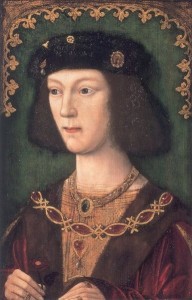
Fifty-two year old Henry VII died at Richmond Palace on the night of 21st April 1509, passing the throne on to his seventeen-year-old son, Henry. Henry VIII was crowned King on 24th June 1509, in a joint coronation with his new bride, Catherine of Aragon.
Henry VIII’s reign was seen as a new era, a fresh start for England. On the 27th April, the Spanish envoy Fuensalida reported Henry VII’s death, saying: “Henry VII’s death is now public knowledge because Henry VIII is in the Tower and has proclaimed a general pardon. He has released many prisoners and arrested all those responsible for the bribery and tyranny of his father’s reign. The people are very happy and few tears are being shed for Henry VII. Instead, people are as joyful as if they had been released from prison.”
He went on to report that the new king had ordered the arrest of the two officials responsible for collecting “the King’s monies” and that Henry VIII had “proclaimed that all those who feel they were wronged by either his father or his officials should present their reasons to his council so that amends can be made.”1 He saw the new king as one who wanted to fight bribery and corruption.
William Blount, Lord Mountjoy, who knew the new king well and who had been involved in his upbringing, wrote to Erasmus, the Renaissance humanist, scholar and theologian, in 1509 about the new king:
“When you know what a hero now shows himself, how wisely he behaves, what a lover he is of justice and goodness, what affection he bears to the learned, I will venture that you will need no wings to make you fly to behold this new and auspicious star. If you could see how all the world here is rejoicing in the possession of so great a prince, how his life is all their desire, you could not contain your tears of joy. The heavens laugh, the earth exults, all things are full of milk, of honey, of nectar. Avarice is expelled from the country. Liberality scatters wealth with bounteous hand. Our King does not desire gold or gems or precious metals, but virtue, glory and immortality.”2
Henry VIII was a strapping lad of 6’3, he was handsome, he was well-educated, he was intelligent, he was charming, he was athletic, he loved music and poetry, he was a knight who loved jousting and he desired “virtue, glory and immortality”. How England must have rejoiced at this young man becoming king.
Click here to read about the death of Henry VII and John Fisher’s account of his last days.
Notes and Sources
- Starkey, David (2008) Henry: Virtuous Prince, p264, citing LP I i, 11/10i & ii, Correspondencia de Fuensalida, 517.
- Lipscomb, Suzannah (2010) 1536: The Year That Changed Henry VIII, p28-29